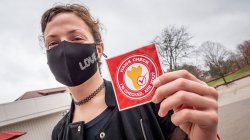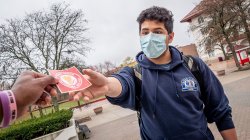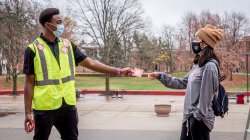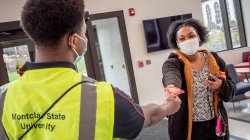Get Your Hawk Check Stickers!
Community Health Ambassadors reward Hawk Check users with stickers and swag
Posted in: Health, University

The willingness of students to wear masks, stay socially distanced, stay in the bubble, do their daily Hawk Check and more, has enabled Montclair State to provide as close to normal a campus experience as possible under the circumstances this fall and to avoid the widespread outbreaks seen at other universities.
Now, the University is rewarding those doing their daily self assessment – and reminding them to keep up the good work – with Hawk Check stickers.
The stickers – which read “Hawk Check – I’m Checked. Are You?” – are being distributed by masked-up student Community Health Ambassadors who have been walking around campus, reinforcing good social distancing, the proper use of face coverings and other safety measures since August.
Hawk Check is a quick online survey that asks users to answer a few questions about symptoms and risk factors, and can be accessed easily from any laptop, tablet or smartphone that is connected to the internet. Just visit the Hawk Check link; there’s nothing to download. Everyone who comes to campus (whether every day, or only on certain days) must do Hawk Check. It allows our health care providers to intervene quickly if someone has COVID symptoms or may have been exposed to the virus
To reinforce Hawk Check usage, each of the approximately two dozen Community Health Ambassadors is now armed with 100 Hawk Check stickers for anyone who performs their daily Hawk Check. Other giveaway items include phone sanitizer and Montclair State-branded face masks. In addition, Hawk Check display stands are posted in key campus locations, including Red Hawk Central in College Hall, the Student Center and the Recreation Center, and permanent affixed Hawk Check signage greets visitors at campus entrances, parking garages and attractions.
Finally, Hawk Check door hangers are being placed on room doors in residence halls, reminding students to do their Hawk Check before heading to campus.
The outreach is clearly working, as use of Hawk Check has picked up considerably in recent weeks. On a typical weekday more than 2,000 students and 600 employees do Hawk Check.
Ambassador Manny Wheagar, a junior majoring in Biology, is enthusiastic about promoting Hawk Check. “In order to stay on campus, we must work together, and try our best to slow the spread.”
“We are excited about the Hawk Check stickers,” says Marie Cascarano, coordinator of Health Promotion, Campus Recreation and Intramural Sports, who is running the program with the help of Tara Mellor, associate director of Residence Life. “Most students are really concerned about the health and safety of our community and want to do the right thing. These stickers and our CHA program reinforce that.”

Hawk Check stickers are being given to students and staff who use the Hawk Check self-assessment tool before coming to campus as a reminder to keep up the good work.

Hawk Check is a quick online survey that asks users to answer a few questions about symptoms and risk factors and must be completed before coming to campus.

Community Health Ambassador Manny Wheagar, a junior majoring in Biology, is enthusiastic about promoting Hawk Check. “In order to stay on campus, we must work together, and try our best to slow the spread.”

Community Health Ambassador Manny Wheagar distributes Hawk Check stickers – and promotes COVID-19 prevention behavior – to students and staff on campus.
Story by Staff Writer Mary Barr Mann
You may also like:
Note: On Nov. 3, President Susan A. Cole announced several measures to intensify efforts to protect the campus. Effective November 9, faculty teaching on campus may reduce the amount of on-campus instruction or shift to fully remote classes ahead of the planned transition to 100% online instruction after Thanksgiving. To reduce the risk of importing the virus, the University does not allow visitors in residence halls or academic buildings, unless approved in advance by a dean or vice president, and is asking residential students to remain on campus to the greatest extent possible. Read the president’s message, which provides more details about how Montclair State is ramping up COVID-19 prevention efforts.
